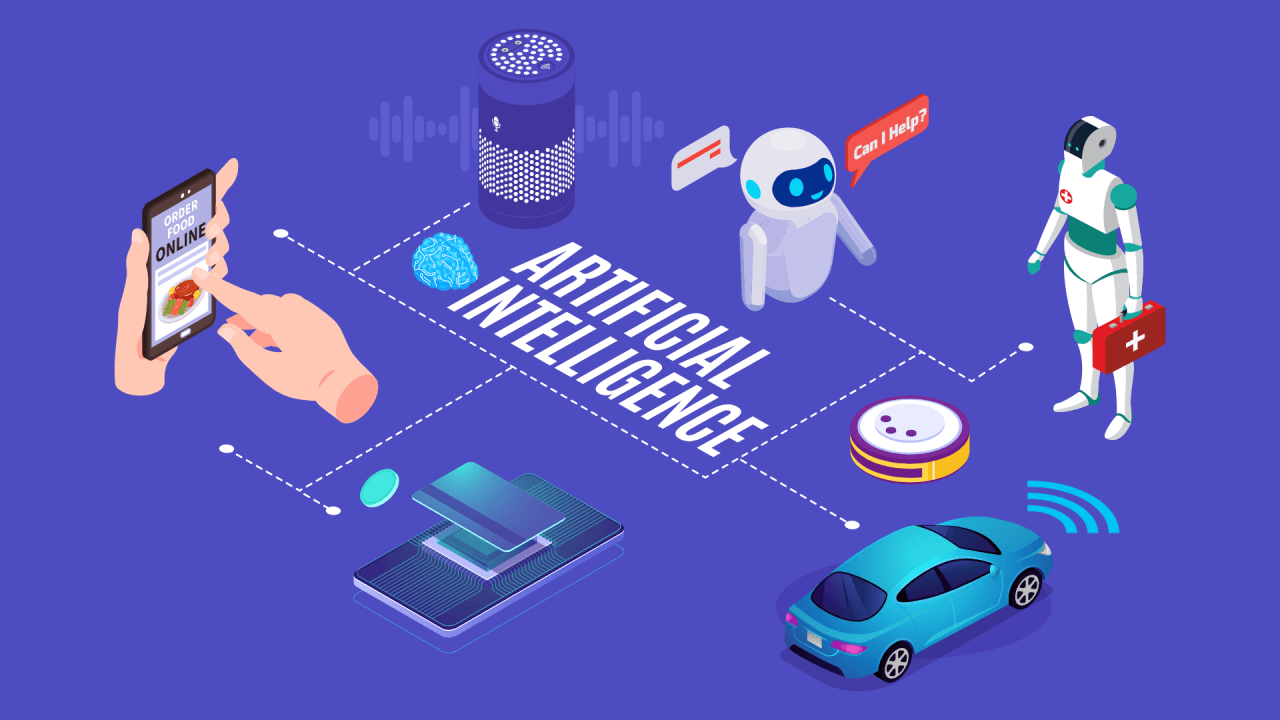

Artificial Intelligence (AI) is rapidly transforming the way we live, work, and interact with the world around us. From smart home devices to advanced healthcare solutions, AI is becoming an integral part of our daily lives. Let’s explore this topic in more detail with 2048 Game below. As we delve into the various applications and implications of AI, we’ll discover how this revolutionary technology is shaping our present and future.
Artificial Intelligence has evolved from a concept of science fiction to a ubiquitous presence in our everyday experiences. From the moment we wake up to the time we go to sleep, AI-powered technologies are working behind the scenes to enhance our lives in countless ways. Smart home assistants respond to our voice commands, personalized recommendations shape our entertainment choices, and predictive algorithms streamline our work processes. The integration of AI into our daily routines has become so seamless that we often take its presence for granted.
One of the most significant areas where AI is making a profound impact is in smart homes and the Internet of Things (IoT). These interconnected systems are revolutionizing the way we manage our living spaces, energy consumption, and personal security. AI-powered smart thermostats learn our temperature preferences and adjust accordingly, while intelligent lighting systems optimize energy usage based on occupancy and natural light levels. Security cameras equipped with facial recognition technology provide enhanced home protection, alerting homeowners to potential threats in real-time.
The convenience offered by AI-driven smart home devices extends beyond basic automation. Voice-activated assistants like Amazon’s Alexa, Google Home, and Apple’s Siri have become central hubs for controlling various aspects of our homes. These AI companions can manage everything from scheduling appointments and setting reminders to controlling appliances and even ordering groceries. As natural language processing capabilities continue to improve, these virtual assistants are becoming increasingly adept at understanding context and nuance, making our interactions with them more natural and intuitive.
Read more: Voice Assistants Are Getting Smarter What’s Next
The healthcare industry is experiencing a transformative shift with the integration of AI technologies. From diagnosis to treatment planning, AI is enhancing the capabilities of medical professionals and improving patient outcomes. Machine learning algorithms can analyze vast amounts of medical data, including patient records, research papers, and clinical trials, to identify patterns and insights that might elude human observers. This capability is particularly valuable in early disease detection and personalized treatment plans.
One of the most promising applications of AI in healthcare is in medical imaging. AI-powered systems can analyze X-rays, MRIs, and CT scans with remarkable accuracy, often detecting abnormalities that human radiologists might miss. This technology not only improves diagnostic accuracy but also speeds up the process, allowing for earlier interventions and potentially life-saving treatments. Additionally, AI is being used to develop more effective drugs and treatments through predictive modeling and simulation, accelerating the traditionally lengthy and costly drug discovery process.
Telemedicine and remote patient monitoring have also been revolutionized by AI. Wearable devices equipped with AI algorithms can continuously track vital signs and alert healthcare providers to potential issues before they become critical. This proactive approach to healthcare not only improves patient outcomes but also reduces the burden on healthcare systems by preventing unnecessary hospitalizations. As AI continues to advance, we can expect to see even more personalized and efficient healthcare solutions that empower individuals to take control of their well-being.
As AI technologies become more sophisticated, there is growing concern about their impact on the job market. While it’s true that certain jobs may be automated or rendered obsolete by AI, this technological revolution is also creating new opportunities and reshaping the skills required in the workforce. The key to thriving in this AI-driven future lies in adapting and developing skills that complement rather than compete with AI capabilities.
Jobs that involve repetitive tasks or data processing are most likely to be automated. However, roles that require creativity, emotional intelligence, critical thinking, and complex problem-solving are less susceptible to automation. As a result, we’re seeing a shift towards jobs that emphasize uniquely human qualities. For example, while AI can analyze financial data with incredible speed and accuracy, human financial advisors are still needed to understand clients’ emotional needs and provide personalized guidance.
The integration of AI into various industries is also creating entirely new job categories. AI specialists, data scientists, and machine learning engineers are in high demand across sectors. Additionally, there’s a growing need for professionals who can bridge the gap between AI systems and human users, such as AI ethicists and user experience designers specializing in human-AI interaction. As AI becomes more prevalent in the workplace, employees in traditional roles are also finding opportunities to upskill and leverage AI tools to enhance their productivity and decision-making capabilities.
As AI becomes more deeply integrated into our lives and society, it’s crucial to address the ethical implications and ensure responsible development and deployment of these technologies. One of the primary concerns is data privacy and security. AI systems often rely on vast amounts of personal data to function effectively, raising questions about how this information is collected, stored, and used. Striking a balance between leveraging data for innovation and protecting individual privacy rights is an ongoing challenge that requires collaboration between technologists, policymakers, and ethicists.
Another significant ethical concern is algorithmic bias. AI systems are only as unbiased as the data they’re trained on and the humans who design them. If not carefully developed and monitored, AI algorithms can perpetuate and even amplify existing societal biases related to race, gender, age, and other factors. This issue is particularly critical in areas such as hiring, lending, and criminal justice, where biased AI decisions can have serious consequences on individuals’ lives. Addressing this challenge requires diverse teams in AI development, rigorous testing for bias, and ongoing monitoring of AI systems in real-world applications.
The concept of AI accountability is also gaining prominence. As AI systems become more autonomous and make decisions that impact human lives, questions arise about who is responsible when things go wrong. Establishing clear guidelines for AI accountability and transparency is essential for building public trust in these technologies. This includes developing explainable AI systems that can provide clear rationales for their decisions and creating regulatory frameworks that ensure AI is developed and used in ways that benefit society as a whole.
The true potential of AI is being realized through its convergence with other cutting-edge technologies. The intersection of AI with robotics, for instance, is giving rise to more sophisticated and capable autonomous systems. From self-driving cars to robotic surgery assistants, these AI-powered machines are pushing the boundaries of what’s possible in transportation, manufacturing, and healthcare. As AI algorithms become more advanced and robotic hardware more refined, we can expect to see increasingly complex and adaptable robotic systems that can operate in diverse and unpredictable environments.
The combination of AI and quantum computing is another area of exciting potential. Quantum computers have the ability to process vast amounts of data and solve complex problems at speeds unattainable by classical computers. When coupled with AI algorithms, quantum computing could lead to breakthroughs in fields such as drug discovery, materials science, and climate modeling. While practical quantum computing is still in its early stages, researchers are already exploring how quantum-enhanced AI could revolutionize everything from financial modeling to cryptography.
In the realm of biotechnology, AI is accelerating research and development in unprecedented ways. Machine learning algorithms can analyze genetic data to identify potential drug targets, predict protein structures, and even design new molecules. This synergy between AI and biotech is not only speeding up the drug discovery process but also opening up new possibilities in personalized medicine, gene therapy, and synthetic biology. As these technologies continue to evolve and intersect, we may see transformative advances in our ability to treat diseases, extend human longevity, and enhance our physical and cognitive capabilities.
The Internet of Things (IoT) is yet another domain where AI is making a significant impact. As billions of connected devices generate massive amounts of data, AI algorithms are essential for making sense of this information and deriving actionable insights. In smart cities, for example, AI-powered IoT systems can optimize traffic flow, reduce energy consumption, and improve public safety. On a smaller scale, AI-enhanced IoT devices in our homes and workplaces are creating more responsive and efficient environments that adapt to our needs and preferences.
Read more: How to Use AI Tools for Graphic Design and Art
The field of AI is rapidly evolving, with new breakthroughs and applications emerging regularly. One of the most exciting recent developments is in the area of generative AI. Systems like GPT-3 (Generative Pre-trained Transformer 3) have demonstrated remarkable abilities in natural language processing, capable of generating human-like text, answering questions, and even writing code. This technology has implications across various industries, from content creation and customer service to software development and scientific research.
Autonomous systems are becoming increasingly sophisticated, with AI-powered drones, robots, and vehicles capable of navigating complex environments and making decisions in real-time. These systems are finding applications in areas such as search and rescue operations, warehouse management, and last-mile delivery services. As autonomous technologies continue to advance, we can expect to see them playing larger roles in transportation, logistics, and even space exploration.